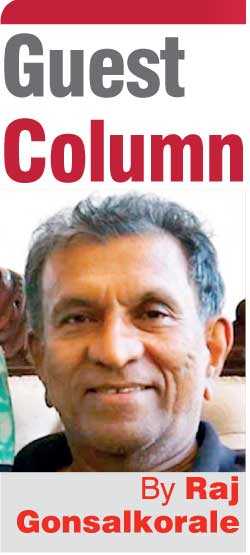Friday Feb 06, 2026
Friday Feb 06, 2026
Saturday, 27 July 2019 04:36 - - {{hitsCtrl.values.hits}}
 How does this apply to Sri Lanka? What is the relevance? Well, if we refer to the state of the country today and how dirty and muddy it is, how soiled the politicians are as the dirty water, and the political structure as the baby, many are advocating that we throw not only the muddy water but the baby out as well
How does this apply to Sri Lanka? What is the relevance? Well, if we refer to the state of the country today and how dirty and muddy it is, how soiled the politicians are as the dirty water, and the political structure as the baby, many are advocating that we throw not only the muddy water but the baby out as well
‘Don’t throw the baby out with the bathwater’ is an idiomatic expression for an avoidable error in which something good is eliminated when trying to get rid of something bad, or in other words, rejecting the favourable along with the unfavourable.
A slightly different explanation suggests this flexible catchphrase has to do with discarding the essential while retaining the superfluous because of excessive zeal.
This idiom derives from a German proverb, das Kind mit dem Bade ausschütten. The earliest record of this phrase is in 1512, in Narrenbeschwörung (Appeal to Fools) by Thomas Murner; and this book includes a woodcut illustration showing a woman tossing a baby out with waste water. It is said that the bath water got dirty as bathing was not an easy process long ago in countries with cold winters and when it happened, the same heated water in a large basin or bath tub was used with a hierarchy being applied as to who bathed first, with the man in the house getting the first opportunity to bathe first followed by a retinue of the family. At the end of the exercise, the water had got so dirty and legend has it that a baby was thrown out with the bath water as no one could see the baby in that dirty water.
How does this apply to Sri Lanka? What is the relevance? Well, if we refer to the state of the country today and how dirty and muddy it is, how soiled the politicians are as the dirty water, and the political structure as the baby, many are advocating that we throw not only the muddy water but the baby out as well. The issue before many is whether we can cleanse Sri Lanka without changing the political structure upon which the dirty environment rests.
There is little argument about the soiled reputation of our politicians. There is little argument that the entire governing system, from politicians to many senior administration officials, police officials, judiciary, to office assistants in the system have lowered themselves to the lowest common denominator and the country works on bribes and sathosams. No doubt there are still some good people left and they should not be forgotten and painted with the same brush. But sadly they appear to be in the minority although without facts, it is unjust to make such an assumption. However, the overwhelming ethos appears to be that the country works on bribery and corruption.
The argument then shifts to the question whether we wish to throw the soiled water with the baby or without the baby. The baby being the political structure of the country.
One Presidential hopeful has advocated a wholesale change to the political structure as without doing so, there will be very little chance of the water remaining clean even if the soiled water is replaced with clean water. No other would be aspirants (several names have been mentioned in the media) have said anything or anything much about changing the political structure.

The political structure we have is based on an inheritance from our British colonial occupiers. It is a mix of the Westminster system, a bit of the French system (watered down with the 19th Amendment) and pickings from the Indian system as the main contributors to our system. Suffice to say that even after 70 years we still have not found a system to suit us.
One major flaw in our system is the power politicians have to dictate how administrative implementation is carried out by those responsible for this. The judiciary, the law enforcement authorities, the administrative service both at national level and provincial level, are all influenced by politicians, in almost all instances, for personal reasons of the politicians.
Tracing the beginnings of this rot, one could say the appointment of some members of Parliament as political authorities to oversee how the administrative service was delivering services to people during the time of Sirimavo Bandaranaike’s regime from 1970 to 1977, let the Genie out of the bottle. Since then, there has not been any holding back. The agencies responsible for delivery services to people became docile and obedient servants of the self-centred politicians, and not the people who they were hitherto serving.
The thinking behind this move may have been good and honourable, but when the task is given to people who are not honourable, the good intentions become dishonourable as well. Today, the feeling amongst many ordinary people, rightly or not, who vote in their representatives to Parliament, Provincial Councils and local government bodies is that they have had no choice but to vote in thugs, drug dealers, murderers, rapists, bribe takers and generally, the scum of the earth, as only such people came forward to contest, or even some good people who contested and win, became like the rest in no time. This is sadly the ethos that exists and even the good are tainted by the bad.
If one looks towards the religious institutions, we see two extremes. The docility of some leaders of institutions, happily ensconced in their comfort zones have given opportunities to zealots who brand an ultra-nationalistic fervour often of Sinhala Buddhist nationalism flavour and casting a shadow and doubts on what Buddhism is. We see at the other end of the spectrum some leaders of religious institutions going beyond their call and venturing into direct political confrontations.
By and large, the vociferous ones are reactionary and do not offer solutions to structural problems, and the docile neither react nor think of solutions to problems that are staring in our faces. The vociferous civil society who were invigorated in the 2015 regime change have largely been hibernating and have not thought it fit to suggest changes that are needed to the political structure. They seem to be happy with the baby as well as the dirty water.
There is little argument that the water is dirty in the basin. The issue is, does the structure make the water dirty even if there is fresh water in the basin? There is a growing consensus that this is indeed the case.
The discussion and debate must therefore shift to the structure of our political system. We should talk about the role of politicians, their responsibilities and their accountabilities. We should talk about the role of the implementers, their role, responsibilities and accountabilities. We should talk about where one draws a line between the first and second categories. We should talk about how people’s views are sought and translated into policy. We should talk about how people are represented in the different components of the political structure. How people can seek redress to their problems within the geographical areas they live in.
It may not be possible for all this to happen before the next Presidential and Parliamentary elections and as we have collectively been either indifferent to these crucial questions or felt helpless even if we were cognisant of them, there should be an expectation that Presidential and Parliamentary hopefuls should offer some options to the people when they seek their vote. We cannot have more of the same as doing so for reasons such as gratitude for past achievements and ground popularity should not be a criterion for re-electing someone or a group.
The country needs ideas on how the broken and sick political structure could be mended and treated. It is not just a leader who has to be strong. There has to be a structure that sustains not just such leaders but the country as a whole.
Leaders and political parties that produce manifestos during election time must be held accountable for what they include in such documents. A legally enforceable code of conduct could be introduced to ensure a degree of honesty amongst politicians. There can be many more suggestions as to how we could improve our political structure and the implementation structure so that the people could be better served by both.
This discussion is not happening. We are all complaining the water is dirty and wanting to throw it out. The foundations of a structure are there, and we should not throw that out. We should tailor it to suit us and bring accountability, adherence to the law of the land without fear or favour, credibility to the structure and those who are in it, and honour and dignity to the country.